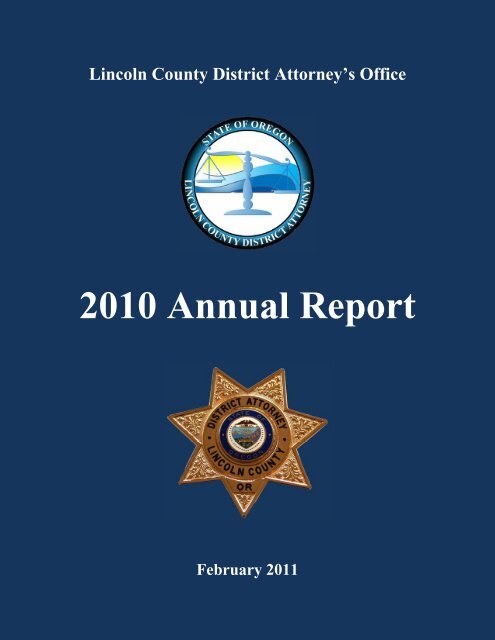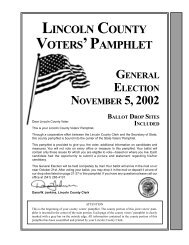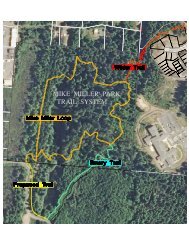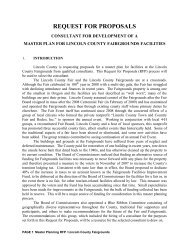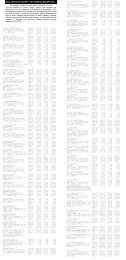2010 Annual Report - Lincoln County, Oregon
2010 Annual Report - Lincoln County, Oregon
2010 Annual Report - Lincoln County, Oregon
You also want an ePaper? Increase the reach of your titles
YUMPU automatically turns print PDFs into web optimized ePapers that Google loves.
<strong>Lincoln</strong> <strong>County</strong> District Attorney’s Office<br />
<strong>2010</strong> <strong>Annual</strong> <strong>Report</strong><br />
February 2011
Please send comments, questions, and suggestions regarding this <strong>Annual</strong> <strong>Report</strong> to:<br />
Rob Bovett<br />
<strong>Lincoln</strong> <strong>County</strong> District Attorney<br />
225 W Olive Street, Room 100<br />
Newport, OR 97365<br />
541-265-0269<br />
rbovett@co.lincoln.or.us
<strong>Lincoln</strong> <strong>County</strong> District Attorney’s Office<br />
2009 <strong>Annual</strong> <strong>Report</strong><br />
INDEX<br />
1. Introduction 1<br />
2. Who We Are 1<br />
a. Staffing 1<br />
b. Volunteers 1<br />
c. Second Major Office Reorganization 2<br />
3. What We Do 2<br />
a. Our Mission Statement 2<br />
b. Prosecution of Criminal Cases 2<br />
c. Victim Support Services and Advocacy 3<br />
d. Child Support Enforcement 3<br />
e. Medical Examiner 3<br />
4. Coordination 3<br />
a. Law Enforcement Administrators Meetings 3<br />
b. Judges Meetings 4<br />
c. Local Public Safety Coordinating Council (LPSCC) 4<br />
d. Many Others 4<br />
• Major Crime Team (MCT) 4<br />
• Multi-Disciplinary Team (MDT) 4<br />
• Elder Abuse MDT 4<br />
• Sexual Assault Response Team (SART) 4<br />
• Domestic Violence (DV) Council 4<br />
• <strong>Lincoln</strong> Interagency Narcotics Team (LINT) 5<br />
• Drug and HOPE Court Team 5<br />
5. Grand Jury 5<br />
6. Training for Law Enforcement Partners 5<br />
7. Problem Solving Courts 5<br />
a. Drug Court 6<br />
b. Domestic Violence Court 6<br />
c. HOPE Court 7<br />
d. Mental Health Court 7<br />
e. Expedited Case Resolution Docket 7<br />
8. Meth Initiative 8<br />
a. <strong>Lincoln</strong> <strong>County</strong> Youth Film Program 8<br />
b. <strong>Lincoln</strong> <strong>County</strong> Drug and HOPE Courts 8<br />
c. <strong>Lincoln</strong> <strong>County</strong> Drug Endangered Children (DEC) Program 8<br />
d. <strong>Oregon</strong>’s Response to the Meth Epidemic 8<br />
9. Crime 9<br />
10. Staff Roster and Assignments 10
Reminders about life . . .<br />
The year <strong>2010</strong>, as well as early 2011, served as reminders about how fragile<br />
life can be. Two examples:<br />
1. We lost a treasured friend and colleague, Melinda Dickinson, to a heart<br />
attack after a long and courageous battle against cancer. Melinda had a long<br />
career with law enforcement agencies in <strong>Lincoln</strong> <strong>County</strong>, most recently<br />
serving as a Legal Assistant with the District Attorney’s Office. Heart<br />
disease is the number one killer of women, and we sponsored a Resolution<br />
in memory of Melinda before the Board of Commissioners to help raise<br />
public awareness. A copy of that resolution is on the inside of the back<br />
cover of this <strong>Annual</strong> <strong>Report</strong>. We encourage everyone to read that<br />
Resolution and learn more about this important issue.<br />
2. <strong>2010</strong> and early 2011 also reminded us how dangerous it is to serve as a law<br />
enforcement officer. With multiple shootings and killings of police officers<br />
around the nation, the message loudly came home to <strong>Lincoln</strong> <strong>County</strong> in<br />
early 2011 with the shooting of <strong>Lincoln</strong> City Police Officer Steven Dodds<br />
during a routine traffic stop. Officer Dodds, twice chosen by his peers as<br />
<strong>Lincoln</strong> City Officer of the Year, was severely wounded in the attack. The<br />
good news is that Officer Dodds has survived and is recovering. We have<br />
been incredibly proud of the <strong>Lincoln</strong> <strong>County</strong> community for its strong and<br />
unwavering display of support for Officer Dodds and his family. The<br />
search for his assailant continues.<br />
At various times many of us have been wearing a red ribbon in honor of<br />
Melinda and a blue ribbon in honor of Steve.
1. Introduction<br />
Dear fellow <strong>Lincoln</strong> <strong>County</strong> citizens, law enforcement partners, and local media:<br />
It has been my distinct honor to serve as your <strong>Lincoln</strong> <strong>County</strong> District Attorney for the past two<br />
years. I continue to be humbled by the dedication, passion, and commitment of the staff and<br />
volunteers of your District Attorney’s Office, as well as our law enforcement partners.<br />
The purpose of this <strong>Annual</strong> <strong>Report</strong> is to review some of the progress made over the past year,<br />
as well as briefly describe our current initiatives to improve public safety in <strong>Lincoln</strong> <strong>County</strong>.<br />
We have attempted to keep this <strong>Annual</strong> <strong>Report</strong> clear, concise, and concrete, as well as brief and<br />
to the point. However, I have no doubt that we may have skipped, not adequately covered, or spent too<br />
much time on certain issues. I therefore ask for your feedback, input, and suggestions, so that we may<br />
improve our <strong>Annual</strong> <strong>Report</strong> in years to come.<br />
Sincerely,<br />
2. Who We Are<br />
a. Staffing<br />
Rob Bovett<br />
<strong>Lincoln</strong> <strong>County</strong> District Attorney<br />
The staff of your District Attorney’s Office consists of eight Deputy District Attorneys, seven<br />
Legal Assistants, three Victim Advocates, two Child Support Caseworkers, an Investigator, a Records<br />
Technician, a Victim Assistance Program Manager, a Case Manager, an Office Manager, a Chief<br />
Deputy District Attorney, and the District Attorney.<br />
This totals 27 employees. Twenty-three are full-time, and four are half-time, for a total of 25<br />
Full Time Equivalent (FTE) positions. Just over 16 of those 25 FTE are supported by the <strong>County</strong><br />
General Fund. The rest are funded through grants or other state and federal sources.<br />
b. Volunteers<br />
The <strong>Lincoln</strong> <strong>County</strong> District Attorney’s Office is also blessed with many dedicated volunteers<br />
that help us perform critical and core functions. We simply could not continue to function without our<br />
volunteers. Traditional areas of volunteer work in the District Attorney’s Office include administration<br />
and victim advocacy. In <strong>2010</strong> we further expanded the role of volunteers, which now include an<br />
investigator and two highly experienced special prosecutors.<br />
Volunteer opportunities are always available, and we encourage all those interested in<br />
volunteering with our office to contact our Office Manager.<br />
<strong>Lincoln</strong> <strong>County</strong> District Attorney’s Office – <strong>2010</strong> <strong>Annual</strong> <strong>Report</strong> – page 1 of 10
c. Second Major Office Reorganization<br />
As a result of further budget cuts, including the loss of two additional FTE, we implemented a<br />
second major reorganization of the office. As with the first reorganization completed in 2009, the staff<br />
of the District Attorney’s Office helped design and implement our <strong>2010</strong> reorganization. Attached as<br />
page 10 of this <strong>Annual</strong> <strong>Report</strong> is a single page Roster and Assignment sheet giving a brief overview of<br />
our current office configuration, along with contact information.<br />
3. What We Do<br />
In summary, the <strong>Lincoln</strong> <strong>County</strong> District Attorney's Office prosecutes crimes, provides services<br />
to crime victims, provides training and resources for our law enforcement partners, facilitates child<br />
support enforcement, and handles child dependency cases.<br />
a. Our Mission Statement<br />
The <strong>Lincoln</strong> <strong>County</strong> District Attorney's Office is committed to holding offenders accountable,<br />
providing services to victims of crime, and using teamwork, leadership, and collaboration to make<br />
<strong>Lincoln</strong> <strong>County</strong> a safer and better place to live.<br />
b. Prosecution of Criminal Cases<br />
The largest single function of the District Attorney’s Office is to review cases referred to us by<br />
our law enforcement partners, determine whether to charge one or more crimes or violations in each<br />
case and, for those cases where charges are filed, prosecute the cases on behalf of the State of <strong>Oregon</strong>.<br />
Just over 3,100 cases are referred to us each year by our law enforcement partners. Below is a graph<br />
showing total case referrals to the District Attorney’s Office from 2005 through <strong>2010</strong>, as well as<br />
broken out by felonies and misdemeanors.<br />
Figure 1. Case Referrals to the <strong>Lincoln</strong> <strong>County</strong> District Attorney’s Office<br />
<strong>Lincoln</strong> <strong>County</strong> District Attorney’s Office – <strong>2010</strong> <strong>Annual</strong> <strong>Report</strong> – page 2 of 10
A big caution: The number of case referrals to the District Attorney’s Office is not a direct<br />
correlation with crime rates. It is more a reflection of law enforcement staffing levels. By way of<br />
extreme example, if we laid off all of our law enforcement officers, case referrals to the District<br />
Attorney’s Office would go to near zero, but reported crime would go through the roof.<br />
That being said, the ratio of felony referrals as compared to misdemeanors continues to decline<br />
(see the green line in Figure 1 on the preceding page). This is a good trend, of course. Misdemeanors<br />
also declined in <strong>2010</strong> (see the red trend line in Figure 1), but this is only a one year trend.<br />
c. Victim Support Services and Advocacy<br />
A key function of the District Attorney’s Office is to provide direct services to victims of crime.<br />
These services include, but are not limited to, notification of crime victim’s rights, notification of court<br />
proceedings, assistance with resource referral, assistance with crime victim compensation applications,<br />
and advocacy in court proceedings.<br />
Many of our partner agencies, such as My Sister’s Place and the Children’s Advocacy Center,<br />
also provide direct services to crime victims. Our advocates work closely with those agencies to<br />
coordinate services.<br />
d. Child Support Enforcement<br />
The District Attorney’s Office is also charged with enforcing child support obligations, both<br />
current and past due child support payments, on behalf of those to whom payments are due. These duties<br />
are carried out in accordance with state and federal law, and in close consultation and collaboration with<br />
the <strong>Oregon</strong> Department of Justice.<br />
e. Medical Examiner<br />
Under <strong>Oregon</strong> law, a county Medical Examiner is required to investigate all deaths which occur<br />
outside of institutions, and to process death certificates. Medical Examiner services in <strong>Lincoln</strong> <strong>County</strong><br />
are provided through contract with a local physician, who works closely with the District Attorney’s<br />
Investigator, Crash Team, Major Crime Team, and others.<br />
4. Coordination<br />
A critical part of our work is to ensure that we utilize our resources to deliver the best possible<br />
public safety services for the citizens of <strong>Lincoln</strong> <strong>County</strong>. This cannot effectively be accomplished<br />
without close collaboration with our courts and law enforcement partners.<br />
a. Law Enforcement Administrators Meetings<br />
Each month the law enforcement agency administrators meet to discuss issues, challenges, and<br />
opportunities for improvement. The location of the meetings rotate among the law enforcement<br />
agency offices. These meetings help coordinate our efforts, build teamwork, improve efficiencies, and<br />
head off potential problems.<br />
<strong>Lincoln</strong> <strong>County</strong> District Attorney’s Office – <strong>2010</strong> <strong>Annual</strong> <strong>Report</strong> – page 3 of 10
. Judges Meetings<br />
Each month our four Circuit Court judges and their staff meet with the District Attorney to<br />
discuss issues, challenges, and opportunities for improvement. These meetings have likewise proven<br />
to be highly effective at solving issues, and helping our justice system improve for the 21 st Century.<br />
c. Local Public Safety Coordinating Council (LPSCC)<br />
The <strong>Lincoln</strong> <strong>County</strong> Local Public Safety Coordinating Council is charged with reviewing key<br />
planning efforts to improve public safety in <strong>Lincoln</strong> <strong>County</strong>. LPSCC plays a vital role in reviewing<br />
and approving plans for community corrections, juvenile crime reduction, and implementation of<br />
problem solving courts.<br />
Focus on Predatory Sex Crimes<br />
d. Many Others<br />
There are also many specialized teams that meet<br />
regularly and coordinate activities relating to specific cases<br />
under investigation. Examples include, but are not limited<br />
to:<br />
• The <strong>Lincoln</strong> <strong>County</strong> Major Crime Team (MCT),<br />
which consists of detectives from every law<br />
enforcement agency operating in <strong>Lincoln</strong> <strong>County</strong>, as<br />
well as prosecutors from the District Attorney’s<br />
Office.<br />
• The <strong>Lincoln</strong> <strong>County</strong> Multi-Disciplinary Team<br />
(MDT), which coordinates the investigation and<br />
prosecution of cases involving child abuse and<br />
neglect.<br />
• The <strong>Lincoln</strong> <strong>County</strong> Sexual Assault Response Team<br />
(SART), which coordinates the investigation and<br />
prosecution of cases involving sex crimes committed<br />
against adults.<br />
• The <strong>Lincoln</strong> <strong>County</strong> Elder Abuse MDT, which<br />
coordinates the investigation and prosecution of cases<br />
involving elder abuse and neglect.<br />
• The Domestic Violence (DV) Council, which<br />
coordinates <strong>Lincoln</strong> <strong>County</strong>’s proactive response to<br />
domestic violence, including the <strong>Lincoln</strong> <strong>County</strong><br />
Domestic Assault Response Team (DART) and the<br />
<strong>Lincoln</strong> <strong>County</strong> Domestic Violence (DV) Court.<br />
More on DV Court can be found on page 6.<br />
The District Attorney’s Office is<br />
strongly committed to prosecuting<br />
predatory sex crimes.<br />
<strong>2010</strong> served as a stark reminder that<br />
predators often target the most<br />
vulnerable in our community, such as<br />
children and the elderly. Sometimes<br />
that vulnerability makes these types of<br />
cases especially challenging, but also<br />
vitally important. Two recent cases<br />
serve to make the point:<br />
1. State v Kirk Garrison<br />
Following a 12 week trial prosecuted<br />
by Deputy District Attorney Michelle<br />
Branam, the defendant was convicted<br />
of sexually abusing and raping<br />
multiple at-risk foster children placed<br />
in his care. For those crimes, he was<br />
sentenced to over 40 years in prison.<br />
2. State v John Larsen<br />
Following a trial in January of 2011<br />
prosecuted by Special Prosecutor Alice<br />
Vachss and Deputy District Attorney<br />
Drew Moore, the defendant was<br />
convicted of assaulting and raping<br />
meth-addicted young women. For<br />
those crimes, the defendant was<br />
sentenced to 30 years in prison.<br />
The District Attorney’s Office will<br />
continue to aggressively prosecute<br />
these types of crimes.<br />
<strong>Lincoln</strong> <strong>County</strong> District Attorney’s Office – <strong>2010</strong> <strong>Annual</strong> <strong>Report</strong> – page 4 of 10
• The <strong>Lincoln</strong> Interagency Narcotics Team (LINT), which focuses on mid and upper level drug<br />
dealing and manufacturing in <strong>Lincoln</strong> <strong>County</strong>.<br />
• The <strong>Lincoln</strong> <strong>County</strong> Drug and HOPE Court Team, which meets weekly to staff cases in the<br />
<strong>Lincoln</strong> <strong>County</strong> Drug and HOPE Court Programs. More on those programs can be found on<br />
pages 6 and 7.<br />
5. Grand Jury<br />
The <strong>Lincoln</strong> <strong>County</strong> Grand Jury is a core component of our criminal justice system. The Grand<br />
Jury performs a number of critical functions, most notably hearing evidence and issuing indictments in<br />
felony cases, and authorizing subpoenas during criminal investigations. Each Grand Jury panel serves<br />
for two months, and we currently utilize two simultaneous Grand Jury panels (one meets every<br />
Tuesday, the other every Thursday).<br />
The Grand Jury is also required by law to tour and examine the operations of the <strong>Lincoln</strong><br />
<strong>County</strong> Jail once each year. However, in January of 2009 we implemented, and the Sheriff’s Office<br />
has enthusiastically supported, the expansion of those tours to every Grand Jury panel.<br />
6. Training for Law Enforcement Partners<br />
Laws are constantly being amended by our legislature and interpreted by our courts. This is<br />
especially true when it comes to criminal law. It is therefore vital that we keep our law enforcement<br />
partners up-to-date through regular training.<br />
Therefore, in 2009 the District Attorney’s Office developed and<br />
implemented a training program for our law enforcement partners. We select<br />
training topics that are current and relevant, and also encourage our law<br />
enforcement colleagues to suggest topics. A prosecutor or prosecutors from<br />
our office then provide a training program, followed by a question and answer<br />
period, at a shift change briefing at one of our local law enforcement agency<br />
offices. That training segment is video recorded on DVD by the <strong>Lincoln</strong><br />
<strong>County</strong> Public Information Officer. We then duplicate the DVD and provide a<br />
copy to each law enforcement partner.<br />
7. Problem Solving Courts<br />
In the last part of the 20 th Century, and continuing into this Century, justice systems have<br />
developed and implemented programs to remedy the revolving door of justice, reduce recidivism, and<br />
improve public safety. Some of these initiatives directly involve the participation of our courts. These<br />
are generally referred to as problem solving courts.<br />
These evidence-based court programs save taxpayer dollars, hold offenders accountable, save<br />
lives and families, and reduce recidivism.<br />
<strong>Lincoln</strong> <strong>County</strong> District Attorney’s Office – <strong>2010</strong> <strong>Annual</strong> <strong>Report</strong> – page 5 of 10
Here is a brief overview of the current status of problem solving courts in <strong>Lincoln</strong> <strong>County</strong>:<br />
a. Drug Court<br />
The <strong>Lincoln</strong> <strong>County</strong> Drug Court Program was the first problem solving court implemented in<br />
<strong>Lincoln</strong> <strong>County</strong>. It has been operating for five years. <strong>Oregon</strong> and Florida were the first to pioneer<br />
these courts, and they have now been expanded to nearly every <strong>Oregon</strong> <strong>County</strong> through the passage of<br />
the comprehensive <strong>Oregon</strong> anti-meth legislation in 2005.<br />
Drug Courts are not soft and squishy. They are demanding and tough, and participation<br />
requires at least a one year obligation. Drug Courts save lives and families, and reduce crimes driven<br />
by drug addiction. Drug Court provides treatment, recovery support, and accountability.<br />
In early 2009, we took the last remaining and required steps to implement what are known as<br />
the 10 Key Components of Drug Court, thus ensuring the continuing viability and funding for the<br />
<strong>Lincoln</strong> <strong>County</strong> Drug Court Program, which currently has a capacity of 25 participants.<br />
The Honorable Thomas Branford presides over our Drug Court. In a criminal justice system<br />
constantly filled with sad stories, tragedies, and victims, Drug Court is a beacon of hope and it is<br />
uplifting to see participants get clean and sober, stop committing crimes, and becoming parents once<br />
again.<br />
b. Domestic Violence Court<br />
In early <strong>2010</strong>, we began the <strong>Lincoln</strong> <strong>County</strong> Domestic Violence (DV) Court Program, with the<br />
Honorable Sheryl Bachart presiding. The goal of DV Court is to provide for a relatively uniform<br />
response to domestic violence, as well as a coordinated and rapid disposition of cases to enhance safety<br />
for victims, rehabilitation of offenders, and reduction of recidivism.<br />
In October of <strong>2010</strong>, after eight months of operation, here was Judge Bachart’s assessment of<br />
the DV Court Program:<br />
“I know there are a number of different ways to gauge the success of DV Court, but<br />
from the court's perspective it is a tremendous success thus far. Yesterday, there were<br />
27 persons scheduled to appear for compliance review. (for those appearing yesterday,<br />
they can attest it was standing room only) 26 persons appeared. (this in and of itself is<br />
outstanding!!) The one person who did not appear was still in compliance with DV<br />
classes. Only 4 persons were noncompliant out of the 27. I have nothing to compare<br />
this to, but an 85% compliance rate is pretty amazing! In addition, many of the cases<br />
were 180-day reviews rather than the initial 60-day reviews. In at least 5 cases, no<br />
contact orders were lifted. The report the court receives from Mr. Chapin is that<br />
participation in his classes has increased overall. For these reasons, DV Court is<br />
exceeding any expectation the court had going into this.”<br />
<strong>Lincoln</strong> <strong>County</strong> District Attorney’s Office – <strong>2010</strong> <strong>Annual</strong> <strong>Report</strong> – page 6 of 10
c. HOPE Court<br />
In 2009, we successfully secured funding to begin the <strong>Lincoln</strong> <strong>County</strong> HOPE Court Program.<br />
HOPE Court, which stands for Help and Opportunity through Probation with Enforcement, was<br />
pioneered in Hawaii by a judge who had grown weary of repeatedly sending the same persons to<br />
prison, over and over again, due to property crimes driven by addiction.<br />
The <strong>Oregon</strong> Criminal Justice Commission has estimated that 78 percent of property crimes are<br />
committed by persons seeking to support their substance abuse and addiction.<br />
HOPE Court is very similar to Drug Court, with some key differences: Because HOPE Court<br />
deals primarily with property offenders rather than drug offenders, a key focus is on victim restitution.<br />
Also, sanctions for violations are even more swift and sure.<br />
The Honorable Thomas Branford presides over the <strong>Lincoln</strong> <strong>County</strong> HOPE Court Program,<br />
which has already achieved great success in its goals, while at the same time saving the State of<br />
<strong>Oregon</strong> precious funds during the current state budget crisis.<br />
d. Mental Health Court<br />
Like all other jurisdictions, the criminal justice system in <strong>Lincoln</strong> <strong>County</strong> is often forced to deal<br />
with repeat offenders whose crimes stem primarily from mental illness. Typical examples are<br />
disorderly conduct and criminal trespass.<br />
The system is not well suited to handle such cases, and a Mental Health Court is a proven<br />
method of solving some of those problems and breaking the cycle of crimes driven by mental health<br />
disorders. Key components are diversion from the typical criminal justice system, plus regular court<br />
appearances to ensure appropriate mental health treatment and medication.<br />
Developing and implementing a <strong>Lincoln</strong> <strong>County</strong> Mental Health Court has been a consistent<br />
goal of the Honorable Charles Littlehales, Presiding Judge of the <strong>Lincoln</strong> <strong>County</strong> Circuit Court, and<br />
the Mental Health Subcommittee of the Local Public Safety Coordinating Council.<br />
In early <strong>2010</strong>, the <strong>Lincoln</strong> <strong>County</strong> Mental Health Court Program began with a strong<br />
commitment from the partners, an initial capacity of five participants, and a small amount of funding.<br />
The Program has already achieved great success, and Judge Littlehales recently announced that<br />
Program capacity would therefore be expanded.<br />
e. Expedited Case Resolution Docket<br />
In <strong>2010</strong>, we began working with our judges, court staff, and the head of our defense consortium<br />
to begin the process of establishing the parameters of a court docket to provide for expedited case<br />
resolution. The advantages of such an expedited docket is early intervention, fewer court appearances<br />
by attorneys, less delays, fewer required grand jury proceedings, and reduced crime. There are many<br />
details to work out and issues to sort through before such a docket can be implemented, but it is our<br />
goal to test such a system in 2011.<br />
<strong>Lincoln</strong> <strong>County</strong> District Attorney’s Office – <strong>2010</strong> <strong>Annual</strong> <strong>Report</strong> – page 7 of 10
8. Meth Initiative<br />
The <strong>Lincoln</strong> <strong>County</strong> Meth Initiative focuses on<br />
delivery of science-based prevention, enforcement, and<br />
treatment services, and has received national and<br />
international acclaim and replication for its accomplishments.<br />
a. <strong>Lincoln</strong> <strong>County</strong> Youth Film Program<br />
In contrast to our natural instincts, decades of prevention science tell us that we can’t scare our<br />
children into not using and becoming addicted to drugs. One effective tool, however, is direct<br />
education and information, and this tool is amplified when the educators are peers.<br />
Thus became the <strong>Lincoln</strong> <strong>County</strong> Youth Film Program,<br />
featuring drug awareness film and media products that are<br />
produced, written, and directed by the youth of <strong>Lincoln</strong><br />
<strong>County</strong>, supported by our own teachers and filmmakers-inresidence<br />
from the Northwest Film Center.<br />
Now in its seventh consecutive year, the <strong>Lincoln</strong> <strong>County</strong><br />
Youth Film Program has produced film and media products that have been shown and showcased on<br />
national and international stages.<br />
b. <strong>Lincoln</strong> <strong>County</strong> Drug and HOPE Courts<br />
See pages 6 and 7 of this report for a description of the Drug Court and HOPE Court Programs.<br />
c. <strong>Lincoln</strong> <strong>County</strong> Drug Endangered Children (DEC) Program<br />
The <strong>Lincoln</strong> <strong>County</strong> Drug Endangered Children (DEC) Program helps to break the cycle of<br />
addiction and heals families wherever possible. The DEC Program provides direct services for drug<br />
endangered children and their families through the Children’s Advocacy Center and state child<br />
welfare, including replacement clothing and personal effects, medical services, and counseling.<br />
d. <strong>Oregon</strong>’s Response to the Meth Epidemic<br />
The <strong>Lincoln</strong> <strong>County</strong> Meth Initiative led <strong>Oregon</strong>’s response to the meth epidemic. Extensive<br />
media coverage and spreading the word about the dramatic positive results have recently led other<br />
states and nations to follow <strong>Oregon</strong>’s lead.<br />
In <strong>2010</strong>, the State of Mississippi followed suit and has already experienced impressive results.<br />
Similar legislation is currently pending in many other states.<br />
In <strong>Oregon</strong> we continue to promote science-based drug policies. Our most recent efforts are<br />
designed to address escalating levels of addiction to prescription drugs, especially among our youth.<br />
Figure 2 on the next page depicts recent drug abuse trends in <strong>Oregon</strong> as measured by treatment<br />
admissions.<br />
<strong>Lincoln</strong> <strong>County</strong> District Attorney’s Office – <strong>2010</strong> <strong>Annual</strong> <strong>Report</strong> – page 8 of 10
9. Crime<br />
In 2009, <strong>Oregon</strong> experienced the largest drop in crime rates in our nation. By <strong>2010</strong>, <strong>Oregon</strong><br />
crime rates were at a 50 year low. <strong>Oregon</strong>’s response to the meth epidemic has been credited by the<br />
<strong>Oregon</strong> Criminal Justice Commission and The <strong>Oregon</strong>ian as one of the reasons behind this good news.<br />
Public perception is, however, quite another thing. In February of 2011, the Criminal Justice<br />
Policy Research Institute (CJPRI) of Portland State University issued a report which concluded, among<br />
other things, that:<br />
• “<strong>Oregon</strong>’s violent and property crime rate trends continue to decline. Crime<br />
rates in <strong>Oregon</strong> are at their lowest level since the 1960’s.”<br />
• “However, a recent statewide survey indicates most <strong>Oregon</strong>ians believed crime<br />
across the state increased last year and very few believed crime decreased.”<br />
Although reported crime rates in <strong>Oregon</strong> are available for 2009, and preliminary rates are<br />
available for <strong>2010</strong>, they are not yet available for <strong>Lincoln</strong> <strong>County</strong> specifically. Hopefully that data will<br />
be available soon, so we are providing the following two hyperlinks to the web pages for the usual<br />
sources for that information:<br />
• <strong>Oregon</strong> State Police, Criminal Justice Information System (CJIS)<br />
• <strong>Oregon</strong> Criminal Justice Commission, Statistical Analysis Center (SAC)<br />
<strong>Lincoln</strong> <strong>County</strong> District Attorney’s Office – <strong>2010</strong> <strong>Annual</strong> <strong>Report</strong> – page 9 of 10
<strong>Lincoln</strong> <strong>County</strong> District Attorney’s Office<br />
ROSTER and ASSIGNMENTS<br />
Linda Evans, Front Desk, 265-4145, levans@co.lincoln.or.us<br />
o Linda also handles conviction requests and discovery billing<br />
Gina Lekas, Case Manager, 265-0253, glekas@co.lincoln.or.us<br />
Jill Wagner, Office Manager, 265-0257, jwagner@co.lincoln.or.us<br />
Ron Benson, Investigator, 265-0271, rbenson@co.lincoln.or.us<br />
Brenda Sigmon, Records Technician, 265-0263, bsigmon@co.lincoln.or.us<br />
Prosecutors<br />
Drew Moore, 265-0251<br />
dmoore@co.lincoln.or.us<br />
Marcia Buckley, 265-0276<br />
mbuckley@co.lincoln.or.us<br />
<br />
Legal Assistants<br />
Diana Flescher, 265-0250<br />
dflescher@co.lincoln.or.us<br />
Diana also handles special prosecutions<br />
Michelle Branam, 265-0260<br />
mbranam@co.lincoln.or.us<br />
Jonathan Cable, 265-0254 (except juvenile dependency)<br />
jcable@co.lincoln.or.us<br />
Brian Gardner, 265-0246 (except juvenile delinquency)<br />
bgardner@co.lincoln.or.us<br />
Nelly Wright, 265-0264<br />
nwright@co.lincoln.or.us<br />
Kylie Andrisa, 265-0258<br />
kandrisa@co.lincoln.or.us<br />
Rob Bovett, 265-0269 (probation violations)<br />
rbovett@co.lincoln.or.us<br />
Elijah Michalowski, 265-0252<br />
emichalowski@co.lincoln.or.us<br />
Brian Gardner, 265-0246 (juvenile delinquency)<br />
bgardner@co.lincoln.or.us<br />
Vacant, (child support enforcement and child dependency)<br />
Jonathan Cable, 265-0254 (juvenile dependency)<br />
jcable@co.lincoln.or.us<br />
Rob Bovett, 265-0269 (except probation violations)<br />
rbovett@co.lincoln.or.us<br />
<br />
<br />
<br />
<br />
<br />
<br />
<br />
Carol Quayle, 265-0249<br />
cquayle@co.lincoln.or.us<br />
Carol also handles Alice and Kristin<br />
Candi Hart, 265-0248<br />
chart@co.lincoln.or.us<br />
Candi also handles LEDS<br />
Debbie Howard, 265-0274<br />
dhoward@co.lincoln.or.us<br />
Teresa Canfield, 265-0273<br />
tcanfield@co.lincoln.or.us<br />
Jen Tyler, 265-0256<br />
jtyler@co.lincoln.or.us<br />
Paula Deahl, 265-0268<br />
pdeahl@co.lincoln.or.us<br />
Gina Lekas, 265-0253<br />
glekas@co.lincoln.or.us<br />
All DUII cases<br />
<br />
Vangie Eisenbarth, 265-0247<br />
veisenbarth@co.lincoln.or.us<br />
Victims Assistance Program:<br />
Marcia Thompson, Victims Advocate / Program Manager, 265-0265, mthompson@co.lincoln.or.us<br />
Molly Hawley, Part-time Victims Advocate, 265-0267, mhawley@co.lincoln.or.us<br />
Motoko Buehn, Part-time Victims Advocate, 265-0262, mbuehn@co.lincoln.or.us<br />
Julie Bobo-Shisler, Part-time Victims Advocate, 265-0275, JBobo-Shisler@co.lincoln.or.us<br />
<strong>Lincoln</strong> <strong>County</strong> District Attorney’s Office – <strong>2010</strong> <strong>Annual</strong> <strong>Report</strong> – page 10 of 10
<strong>Lincoln</strong> <strong>County</strong> District Attorney’s Office<br />
225 W Olive Street, Room 100<br />
Newport, OR 97365<br />
541-265-4145<br />
www.co.lincoln.or.us/da/


